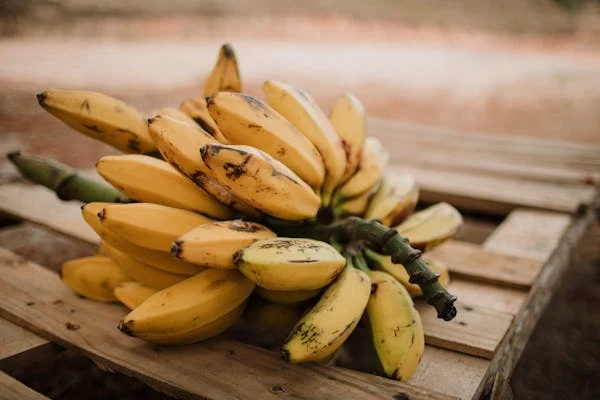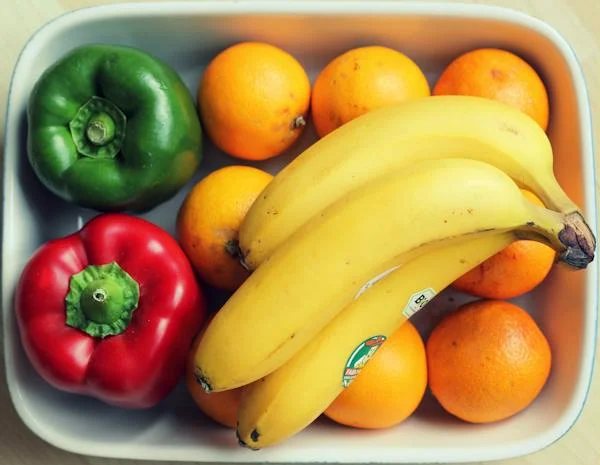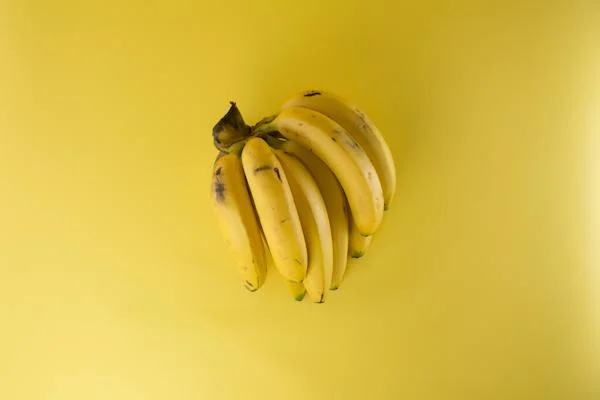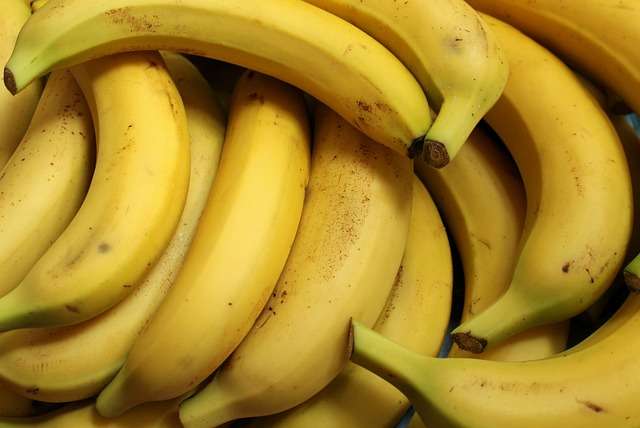Introduction:
The fruit known as a banana is derived from the Moses-related banana plant. One of the most well-liked and commonly consumed fruits worldwide is the banana. They stand out for their characteristic elongated shape, which is often yellow when mature but can occasionally be green, red, or purple depending on the variety.

There are many different nutrition facts of banana kinds produced all over the world, but the metha metha banana, often known as the “Cavendish” banana, is the most popular. Other types include “ladyfinger” bananas, which are smaller and sweeter than plantains and are starchy and typically boiled before consumption.
Typically, bananas are picked when still green and then left to ripen. They turn golden and get sweeter as they ripen. Bananas that are overripe and may have brown patches are frequently used in baking and smoothies.
Nutrition Facts of Banana:
The nutrition facts of bananas offer a range of important vitamins, minerals, carbs, and dietary fiber. Let’s take a deeper look at the vitamins and minerals in bananas:
Calories
A banana’s calorie count might change based on its size and level of ripeness. For people who track their nutrition facts of bananas and calorie consumption as part of their diet, knowing the amount of calories in bananas is crucial. Calories are a measure of the energy we consume. The calorie nutrition facts of bananas are as follows:

-
Small Banana (about 6 inches long): A small banana typically has between 90 and 100 calories, though this number can vary slightly depending on the banana’s particular size and level of ripeness.
-
Medium-sized banana (7-8 inches long): A medium-sized banana usually contains between 105 and 120 calories. Once more, the precise number of calories may differ slightly depending on the particular banana.
-
A large banana (approximately 9 inches or longer): It can have between 121 and 135 calories. Just like with little bananas, the size and freshness of the banana determine how many calories it contains.
Carbohydrates
Since the nutrition facts of bananas are primarily made of carbs, they make a great natural energy source. Bananas include mostly the following types of carbohydrates:
Sugars: Glucose, fructose, and sucrose are among the natural sugars found in bananas. An instant source of energy is offered by these sugars.
Starch: Resistant starch, a kind of dietary fiber, is present in raw bananas. This starch is converted into simple sugars as bananas ripen.
Typically, a medium-sized banana has between 26 and 30 grams of carbs.
Dietary Fiber
Dietary fiber, which is important for digestive health and can help regulate blood sugar levels, is present in bananas in good amounts. Bananas primarily include two different kinds of fiber:

Soluble fiber: Pectin is the primary form of soluble fiber, which aids in slowing digestion and can increase feelings of fullness.
Insoluble fiber: This kind of fiber gives the stool bulk and promotes regular bowel motions.
Usually, a medium-sized banana contains 3 grams of dietary fiber.
Vitamins
Vitamin C: An antioxidant that helps the immune system encourages good skin, and speeds wound healing, is present in bananas in moderate amounts. Approximately 10% of the daily necessary amount of vitamin C is found in a medium-sized banana.
Vitamin B6: Bananas are a particularly good source of vitamin B6 (pyridoxine), which is crucial for metabolism, brain growth, and the generation of neurotransmitters. The amount of vitamin B6 in a medium-sized banana is equivalent to 20% of the daily recommended intake.
Minerals
Potassium: The high potassium content of bananas is well-known. Potassium is a crucial mineral that supports heart health, regulates blood pressure, and keeps muscles and nerves functioning normally. A medium-sized banana provides roughly 9–10% of the daily required potassium consumption with its 400–450 mg potassium content.
Manganese: A trace mineral necessary for healthy bones, metabolism, and antioxidant defense, manganese is also present in bananas. Approximately 13% of the daily required amount of manganese is present in a medium-sized banana.
Health Benefits of Banana:
In addition to being delicious, bananas have a number of health advantages and nutrition facts of banana because of their nutrient-rich makeup. The following are five advantages of eating bananas for health:
1. Heart Health
Potassium, a mineral that is essential for sustaining normal blood pressure levels, is a nutrient that is abundant in bananas. Adequate potassium intake can aid in blood vessel relaxation, lower blood pressure, lower the risk of stroke, and lower the risk of other heart problems.
2. Digestive Health:
Dietary fiber, particularly soluble fiber in the form of pectin, is present in bananas in good amounts. By controlling bowel motions, avoiding constipation, and maintaining general gut health, this fiber helps to promote healthy digestion.

3. Increasing Energy:
Bananas are a quick and healthy source of energy, making them the perfect pre-or post-workout snack for athletes. Bananas’ natural sugars—glucose, fructose, and sucrose—are quickly absorbed and give off energy.
4. Mood Enhancement:
Tryptophan, an amino acid found in bananas, is a precursor to serotonin, a neurotransmitter involved in mood regulation. Eating bananas can help elevate mood and lessen anxiety and depressive symptoms.
5. Filling food:
Bananas are a filling food that is portable easy and full of vital nutrients. They supply minerals like potassium and manganese as well as vitamins like vitamin C (for immunity and skin health) and vitamin B6 (for metabolism and brain function). They are therefore a varied and healthy option for snacks.
How to incorporate Banana into your diet:
Bananas are a versatile and delectable addition to your diet because of their inherent sweetness. The following are various methods to incorporate bananas into your regular meals and snacks:
1. Fresh Breakfast: Eat a ripe banana for a quick and wholesome snack. The greatest choice for a quick energy boost is this.
2. Smoothies: For added nutrients, blend bananas with other fruits (such as plums, mangoes, and pineapple), yogurt, milk (or dairy-free substitutes), and a few leafy greens. Bananas give your smoothie a natural sweetness and creaminess.
3. Cereal or oatmeal: Sliced bananas can be added to your cereal or oatmeal in the morning. For added taste and creaminess, you may also mash them and stir them into your porridge.
4. Pancakes and waffles: For a fun twist, mix some mashed bananas into the batter for your pancakes or waffles. Your breakfast is naturally sweetened and moistened with bananas.
5. The Freezing Method: Freeze banana slices for a cool and nutritious frozen treat. You can either dip them in dark chocolate or make a creamy banana “cream of goodness” by blending frozen banana chunks. For variety, mix with chocolate powder, vanilla extract, or other flavors.
FAQs:
-
Can bananas help you lose weight?
Due to their high fiber content, which makes you feel happy and full after eating them, bananas can indeed be a part of a weight loss diet.
-
What should I do to store bananas to prolong their freshness?
To lengthen the shelf life of bananas, store them at room temperature until they are fully ripe. Then, put them in the refrigerator.
-
Are bananas sugary foods?
Yes, bananas naturally contain sugars like sucrose, glucose, and fructose. However, they also offer dietary fiber and necessary minerals.
-
Can you safely eat green bananas?
Although green bananas are perfectly healthy to eat, they are less sweet and more starchy than ripe bananas. They can be prepared in savory recipes or cooked.
-
Is bananas a good supply of potassium?
Yes, bananas are a great source of potassium, which is necessary for preserving normal blood pressure and muscle contraction.
Conclusion:
Last but not least, bananas are a well-liked and nutritious facts of banana, fruit that provides a variety of health advantages and culinary diversity. They are full of carbs, dietary fiber, vitamins (including vitamin C and vitamin B6), minerals (particularly potassium and manganese), and other critical components. These vitamins and minerals promote digestive, cardiovascular, and general health.
In addition to being a delicious and healthy source of energy, the nutrition facts of bananas make them a simple snack and a versatile addition to a wide range of dishes. Bananas are a simple addition to your daily diet and can be eaten fresh, in smoothies, with oatmeal, or in baked goods.
They are a beneficial addition to a balanced diet because of their inherent sweetness and their role in elevating mood and encouraging satiety. Furthermore, they are accessible to people all around the world because of their availability and cost.
